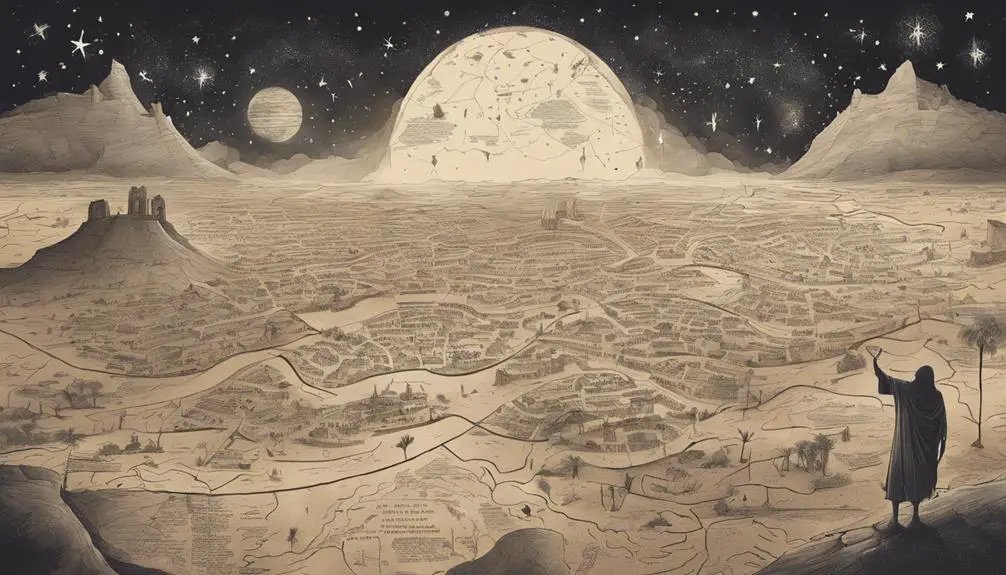Journey through the biblical wilderness of self-discovery and faith, as we unravel the profound implications of Exodus 13:18 in our personal lives.

A Verse in the Bible About Wilderness and Wandering
Imagine you're standing on the edge of a vast desert, symbolizing the biblical concept of wilderness and wandering. In the Bible, this notion is not just physical, but spiritual as well, often depicting a journey of self-discovery and faith.
Consider the verse Exodus 13:18: 'But God led the people around by the desert road toward the Red Sea.' What does this verse stir within you? How does it resonate with your own life's journey?
In the following, we'll explore this further, unveiling layers of meaning that may shed new light on your understanding.
Key Takeaways
- Wilderness in the Bible symbolizes trials and growth, reflecting spiritual hardships and transformative experiences.
- Wandering is not punishment but signifies spiritual journey, revealing God's purpose through testing and growth.
- Biblical wilderness imagery conveys spiritual truths, representing divine encounters amidst harsh conditions.
- Wilderness and wandering remain relevant, symbolizing existential crises and encouraging trust in divine intervention during personal hardships.
Biblical Context of the Verse

To truly grasp the depth of Bible verses about wilderness and wandering, you need to first delve into their historical and literary context. The wilderness, often depicted as a desolate, barren place in the Bible, is a powerful symbol of spiritual and physical trials. It's where the Israelites wandered for 40 years after their Exodus from Egypt, a period marked by uncertainty, testing, and growth.
In the literary context, wilderness and wandering are often used metaphorically to reflect a state of spiritual disarray or a journey of faith. The narratives that unfold in these wilderness wanderings are rich with symbolism and allegory. The wilderness isn't just a geographical location; it's also a state of being, a space for transformation and revelation.
The wandering aspect further deepens the symbolic resonance. Wandering conveys a sense of being lost, yet also a quest for finding. It's a phase of transition and change, a movement from what was known to what's unknown. So, by studying these verses, you aren't just exploring Biblical history; you're delving into universal themes of struggle, transformation, and discovery.
Theological Interpretation of Wandering

Understanding the theological interpretation of wandering requires you to see it not just as physical aimlessness, but as an essential part of spiritual growth and introspection. In the Biblical context, wandering is often associated with trials, testing, and purification. It's a period of uncertainty where faith is tested, and spiritual character is formed.
Theologically, wandering serves as a metaphor for the spiritual journey that believers undertake. It's not a meaningless meandering, rather a purposeful path towards deeper understanding and closeness with God. You'll notice that the Bible doesn't present wandering as a punishment, but as a transformative process leading to a higher spiritual state.
You might infer that wandering represents a necessary stage in the believer's spiritual life. It's during this period that you're stripped of worldly illusions, allowing for a more profound, intimate connection with God. Remember, the end goal isn't just to reach a physical destination, but to attain spiritual maturity and enlightenment. Therefore, wandering isn't something you're meant to fear but to embrace as part of your spiritual growth. It's a journey of self-discovery, faith strengthening, and relationship building with God.
Wilderness Imagery in the Bible

Delving into the Bible's wilderness imagery, you'll see it's a powerful symbol used to depict periods of trial, spiritual growth, and divine encounters. It's not simply a geographical setting, but a spiritual and psychological landscape used to communicate deeper truths.
Consider the following table:
Biblical Story |
Wilderness Symbolism |
Spiritual Implication |
|---|---|---|
Israelites' 40-year journey |
Trial and dependence on God |
Faith and obedience growth |
Jesus's 40-day temptation |
Testing and victory over sin |
Divine power and mission fulfilment |
John the Baptist's ministry |
Prophetic isolation and divine revelation |
Preparation for Christ's advent |
Hagar's desert experience |
Desolation and divine encounter |
God's care and provision in hardship |
In these stories, the wilderness becomes a place of transformation and revelation. It's where God's people are tested, shaped, and often given a new identity. The harsh, barren conditions symbolize the spiritual struggles faced, while divine encounters and revelations in the wilderness underscore God's faithfulness and intervention during challenging times. Hence, the wilderness imagery in the Bible plays a critical role in conveying spiritual realities and divine truths.
Modern Implications and Relevance

While the wilderness imagery in the Bible carries profound spiritual implications, its relevance extends beyond the ancient text to resonate with modern struggles and spiritual experiences. You'll find that the biblical concept of wilderness, often signifying a place of wandering and uncertainty, bears an uncanny resemblance to the modern experience of existential crisis. It's a metaphor for the periods of doubt, confusion, and spiritual dryness that you may encounter in your journey of faith.
The wilderness, in this context, isn't merely a geographical term; it's a psychological and spiritual state. It's a place of testing and growth, where faith is tried and character is formed. This concept is particularly relevant today, as you navigate through the complexities of modern life. The wilderness experience challenges you to confront your vulnerabilities, make tough decisions, and trust in a higher power despite the uncertain circumstances.
Therefore, the biblical imagery of wilderness and wandering isn't archaic or irrelevant. It's a timeless metaphor that continues to speak to your spiritual struggles and experiences. It encourages you to persevere, reassures you that you're not alone in your trials, and promises that there's purpose and redemption in the midst of the wilderness.
Personal Reflections on the Verse

How does this biblical verse about wilderness and wandering resonate with your personal experiences? It's possible that you've felt lost or unsure in your life, separated from a clear path or certain destination. This sense of wandering can feel overwhelming, even frightening, not unlike the wilderness described in the verse.
Analyzing this verse, you may identify parallels between the wilderness journey and your own life experiences. The wilderness, vast and uncharted, mirrors times when you've faced uncertainty, hardship, or significant change. Similarly, wandering can symbolize phases of life when you've felt aimless, devoid of clear direction or purpose.
However, the verse also highlights the transformative power of such experiences. It serves as a reminder that, just as the Israelites found their faith and identity in the wilderness, you too can discover strength and wisdom in times of uncertainty. Your personal wilderness and wandering periods can be instrumental in shaping who you are, and who you'll become.
Conclusion
In conclusion, the Bible's language about wilderness and wandering isn't just a historical narrative. It's an allegorical tool, meant to convey deep theological truths. It portrays our spiritual journey, often characterized by confusion and struggle.
Yet, it also offers hope, reminding us that God guides us through these wilderness periods. So, in your personal wilderness, remember this verse. It's not just a story, it's a divine guidance for your journey.



Sign up